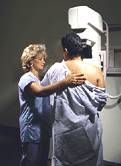- The Best Time of Day to Drink Bone Broth to Maximize Health Benefits
- 8 Ways to Increase Dopamine Naturally
- 7 Best Breads for Maintaining Stable Blood Sugar
- Gelatin vs. Collagen: Which is Best for Skin, Nails, and Joints?
- The Long-Term Effects of Daily Turmeric Supplements on Liver Health
- Could Your Grocery Store Meat Be Causing Recurring UTIs?
- Are You Making This Expensive Thermostat Error This Winter?
- Recognizing the Signs of Hypothyroidism
- 10 Strategies to Overcome Insomnia
- Could Artificial Sweeteners Be Aging the Brain Faster?
Experimental Breast Cancer Drug Seems Safe, Effective for Advanced Disease


In an early trial, an experimental breast cancer drug stopped disease growth and shrank tumors by more than 30 percent in some patients.
The pill, bemaciclib, was safe and well-tolerated by women with breast cancer that had spread, or metastasized, to other parts of the body, according to the results of this phase 1 trial.
“This is a novel oral treatment for patients with metastatic breast cancer,” said lead researcher Dr. Amita Patnaik, the associate director of clinical research at South Texas Accelerated Research Therapeutics in San Antonio.
If these results are replicated in future trials, it’s conceivable that the pill might extend survival for women with terminal breast cancer, experts suggested.
The drug was particularly effective for the most common type of breast cancer, called hormone receptor-positive breast cancer. In this type of cancer, cancer cells grow in response to signals from the hormones estrogen and/or progesterone.
The study included more than 130 women. Overall, Patnaik said half of them had cancer growth controlled and 25 percent had shrinkage of their tumors.
Unlike standard cancer drugs, this is a twice-daily pill that allows women to go on with their daily lives. In contrast, other cancer drugs are given intravenously at a hospital or doctor’s office. Another difference, Patnaik said, is that bemaciclib is a targeted therapy, a newer type of drug that is better able to identify and attack specific cells.
“Our results show that it can be given safely over a long period of time, and patients are able to go on with their routine activities and have a good quality of life,” she said.
Side effects of the drug include diarrhea, nausea and vomiting. For study participants, most of these problems were mild or moderate, Patnaik said.
The trial results were scheduled for presentation Sunday at the annual meeting of the American Association for Cancer Research in San Diego. The study was funded by Eli Lilly and Co., the maker of bemaciclib.
“It is important to remember that this is a first-time evaluation of the drug and these results will have to be confirmed in later studies,” Patnaik cautioned. More trials are being planned, she said.
Dr. Neelima Denduluri, a medical oncologist at Virginia Cancer Specialists in Arlington, pointed out that metastatic breast cancer is generally incurable. “Goals of therapy include maintaining quality of life while administering effective therapy,” said Denduluri, who was not involved in the study.
She said she hopes bemaciclib and other new drugs will make a difference in the treatment of advanced breast cancer.
For hormone receptor-positive breast cancer, doctors often use anti-estrogen therapies. However, tumor cells stop responding to these drugs, so alternatives are often needed, Denduluri said.
“Bemaciclib’s trial results are very exciting and confirm that developing this class of drugs is very promising for patients with advanced breast cancer,” Denduluri added.
For the study, Patnaik’s team tested the drug on 132 women with breast cancer. Forty-seven of them with metastatic cancer had tried as many as seven other drugs before bemaciclib.
The women took bemaciclib pills twice daily for 28 days.
Thirty-six of the 47 patients with metastatic breast cancer had hormone receptor-positive disease, the researchers noted. Nine of the 47 patients had a partial response, and 24 of the 47 patients saw the growth of their cancer stopped.
Among the metastatic breast cancer group, 11 patients had their cancer progress despite treatment, the researchers said.
Among women with hormone receptor-positive breast cancer, 81 percent had a complete response, partial response or stable disease, and their cancer didn’t progress for an average of nine months, the study found. For study participants overall, progression-free survival was nearly 6 months.
The trial lasted 28 days, but women who benefited from the drug could continue on it in 28 day cycles as long as they continued to benefit. Eighteen of the hormone receptor-positive breast cancer patients are still being treated with bemaciclib, said Patnaik.
Dr. Myra Barginear, an oncologist at North Shore-LIJ Cancer Institute in Lake Success, N.Y., is also excited about the potential of this drug and others like it.
“As a breast cancer doctor, I am thrilled to potentially have a new agent for my patients with advanced hormone receptor-positive breast cancer. This is the most common type of breast cancer — representing approximately 80 percent of all cases,” she said.
Data and conclusions presented at meetings are typically considered preliminary until published in a peer-reviewed medical journal.
More information
For more information on breast cancer, visit the American Cancer Society.
Source: HealthDay
Copyright © 2026 HealthDay. All rights reserved.










